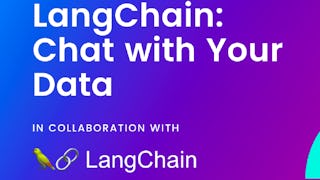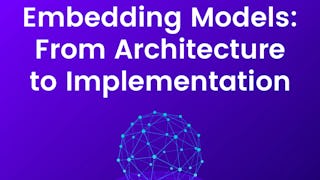Filter by
SubjectRequired
LanguageRequired
The language used throughout the course, in both instruction and assessments.
Learning ProductRequired
LevelRequired
DurationRequired
SkillsRequired
SubtitlesRequired
EducatorRequired
Explore the Kaggle Course Catalog
 Status: Free Trial
Status: Free TrialSkills you'll gain: Exploratory Data Analysis, Data Storytelling, Statistical Hypothesis Testing, Data Ethics, Data Visualization Software, Sampling (Statistics), Data Presentation, Regression Analysis, Feature Engineering, Data Transformation, Descriptive Statistics, Professional Networking, Data Visualization, Tableau Software, Data Manipulation, Statistical Analysis, Statistical Machine Learning, Object Oriented Programming (OOP), Data Analysis, Interviewing Skills
 Status: Free
Status: FreeDeepLearning.AI
Skills you'll gain: Large Language Modeling, Data Processing, Data Store, Data Access, Generative AI, Prompt Engineering, Document Management, Query Languages, Natural Language Processing

Coursera Project Network
Skills you'll gain: Data Cleansing, Data Processing, Applied Machine Learning, Data Import/Export, Python Programming, Google Cloud Platform, Scikit Learn (Machine Learning Library), Predictive Modeling, Supervised Learning, Machine Learning Algorithms
 Status: NewStatus: Free Trial
Status: NewStatus: Free TrialVanderbilt University
Skills you'll gain: SQL, Generative AI, Data Visualization, Data Storytelling, Data Analysis, Debugging, Data-Driven Decision-Making, Exploratory Data Analysis, ChatGPT, Prompt Engineering, Databases
 Status: Free
Status: FreeDeepLearning.AI
Skills you'll gain: Large Language Modeling, Artificial Neural Networks, Deep Learning, Semantic Web, Natural Language Processing, Text Mining, Applied Machine Learning

Skills you'll gain: Image Analysis, Computer Vision, Python Programming, Deep Learning, Real Time Data, Data Processing, Applied Machine Learning, Development Environment, Cloud Storage, Data Collection, Software Installation, System Configuration
 Status: Free
Status: FreeSkills you'll gain: Docker (Software), Application Deployment, Code Review, Containerization, Serverless Computing, Cloud Development, Cloud Applications, Google Cloud Platform, Application Development, Artificial Intelligence, Large Language Modeling, Generative AI, Application Programming Interface (API)
 Status: Free Trial
Status: Free TrialSkills you'll gain: User Experience Design, User Story, Ideation, Usability, Web Content Accessibility Guidelines, User Research, Design Thinking, Human Centered Design, Competitive Analysis, User Flows, Persona Development

Skills you'll gain: Microservices, Application Deployment, Google Cloud Platform, Cloud Applications, Spring Boot, Kubernetes, Java, Software Architecture, Data Migration, Cloud Services, Application Performance Management, Application Programming Interface (API), Databases
 Status: Free Trial
Status: Free TrialSkills you'll gain: Generative AI, Prompt Engineering, Large Language Modeling, Document Management, Natural Language Processing, Unstructured Data, Data Processing, User Interface (UI), Databases, Data Storage Technologies, Data Storage
 Status: Free Trial
Status: Free TrialSkills you'll gain: ChatGPT, Development Environment, Text Mining, Generative AI, OpenAI, Database Management, Data Storage, Data Processing, Natural Language Processing

Coursera Project Network
Skills you'll gain: Canva (Software), Generative AI, Content Creation, Social Media Content, ChatGPT, Digital Content, Graphic and Visual Design, Prompt Engineering, Copywriting, Social Media Marketing, Content Strategy, Content Marketing, Target Audience
In summary, here are 10 of our most popular kaggle courses
- Google Advanced Data Analytics: Google
- LangChain Chat with Your Data: DeepLearning.AI
- Breast Cancer Prediction Using Machine Learning: Coursera Project Network
- Chat with Your Data: Generative AI-Powered SQL Data Analysis: Vanderbilt University
- Embedding Models: From Architecture to Implementation: DeepLearning.AI
- Computer Vision: YOLO Custom Object Detection with Colab GPU: Packt
- Build a Chat Application using the PaLM 2 API on Cloud Run: Google Cloud
- Start the UX Design Process: Empathize, Define, and Ideate: Google
- Building Scalable Java Microservices with Spring Boot and Spring Cloud: Google Cloud
- Project: Generative AI Applications with RAG and LangChain: IBM










